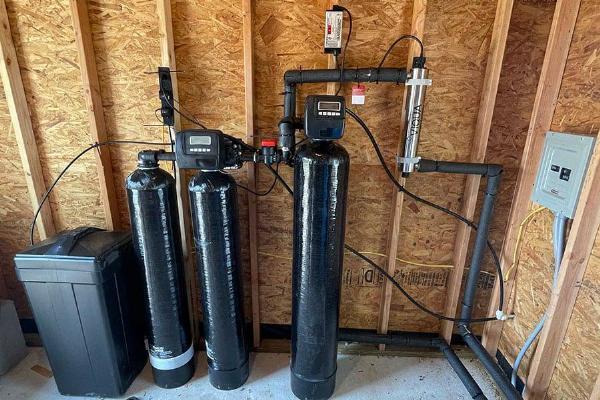The Science Behind Water Softener Systems: How They Work to Improve Water Quality:

Strong 8k brings an ultra-HD IPTV experience to your living room and your pocket.
Water softener systems are a common solution for addressing hard water issues in homes and businesses. But how exactly do these systems work to improve water quality? In this article, we'll delve into the science behind water softener systems and explore the mechanisms that enable them to effectively remove mineral hardness from water.
Understanding Hard Water:
Before diving into the science of water softener systems, it's essential to understand what hard water is and why it's a problem. Hard water contains high levels of dissolved minerals, primarily calcium and magnesium ions, which are naturally present in groundwater sources. These minerals can accumulate in pipes, appliances, and fixtures, leading to limescale buildup, reduced water flow, and decreased efficiency of water-using appliances such as dishwashers and washing machines.
Ion Exchange Process:
At the core of water softener systems is a process called ion exchange, which is the key mechanism responsible for removing mineral hardness from water. The ion exchange process occurs within a tank filled with resin beads coated with sodium ions. When hard water passes through the resin bed, the calcium and magnesium ions in the water are attracted to the negatively charged resin beads and exchange places with the sodium ions.
Regeneration Cycle:
Over time, the resin beads become saturated with calcium and magnesium ions and need to be regenerated to continue effectively softening water. The regeneration process involves flushing the resin bed with a concentrated solution of sodium chloride, commonly known as salt. During regeneration, the sodium ions from the salt solution replace the calcium and magnesium ions on the resin beads, restoring their ability to soften water effectively.
Benefits of Softened Water:
The primary benefit of water softener systems is the transformation of hard water into soft water, which offers several advantages for both households and businesses. Softened water helps prevent limescale buildup in pipes, fixtures, and appliances, extending their lifespan and reducing maintenance costs. It also improves the efficiency of water heaters, dishwashers, and washing machines, resulting in energy savings and reduced utility bills. Additionally, softened water produces cleaner dishes, softer laundry, and smoother skin and hair.
Types of Water Softener Systems:
There are several types of water softener systems available on the market, each utilizing different technologies and mechanisms to soften water. Traditional ion exchange water softeners, as described above, are the most common type and are effective at removing mineral hardness from water. Salt-free water softeners use alternative methods, such as template-assisted crystallization or magnetic fields, to prevent mineral buildup without removing calcium and magnesium ions from the water.
Limitations and Considerations:
While water softener systems offer many benefits, it's essential to consider their limitations and potential drawbacks. One common concern is the increased sodium content in softened water due to the ion exchange process. While the amount of sodium added to softened water is typically minimal and well below the recommended daily intake levels, individuals on sodium-restricted diets may want to consider alternative water treatment options. Additionally, the regeneration process of water softeners requires water and salt, which may contribute to water and energy consumption.
Environmental Impact:
Another consideration is the environmental impact of water softener systems, particularly those that use salt for regeneration. The discharge of brine waste from regeneration cycles can potentially harm aquatic ecosystems and contribute to water pollution. However, many modern water softeners are designed to operate efficiently and minimize salt usage and wastewater generation. Additionally, salt-free water softeners offer a more environmentally friendly alternative by avoiding the use of salt altogether.
Final Thoughts:
In conclusion, water softener systems play a crucial role in improving water quality and addressing the challenges associated with hard water. Through the ion exchange process, these systems effectively remove mineral hardness from water, resulting in numerous benefits for households and businesses. While there are various types of water softener systems available, each with its own advantages and considerations, they all work towards the common goal of providing cleaner, softer water for everyday use. By understanding the science behind water softener systems and considering their limitations and environmental impact, consumers can make informed decisions about selecting the right system for their needs.
Note: IndiBlogHub features both user-submitted and editorial content. We do not verify third-party contributions. Read our Disclaimer and Privacy Policyfor details.




